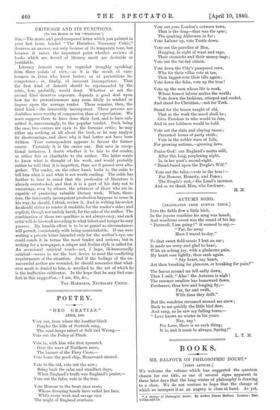CRITICISM AND ITS FUNCTIONS.
[TO THE EDITOR OF THE "SPECTATOR."]
SIR,—The acute and good-tempered letter which you printed in your last issue, headed "The Harmless, Necessary Critic," deserves an answer, not only because of its temperate tone, but because it raises the important point whether reviews of books which are devoid of literary merit are desirable or justifiable.
Literary demerit may be regarded (roughly speaking) from three points of view,—as it is the result of care- lessness in those who know better ; or of pretentious in- competence; or, finally, of innocent incompetence. That the first kind of demerit should be reprimanded by the critic, few, probably, would deny. Whether or not the second kind deserves exposure, depends a good deal upon how far its pretentiousness may seem likely to mislead or impose upon the average reader. There remains, then, the third kind,—the innocently incompetent. These persons are doubtless more worthy of compassion than of reprobation. We must suppose them to have done their best, and to have sub- mitted it, unassumingly, to the popular verdict. Such being the case, two courses are open to the humane critic ; he may either say nothing at all about the book, or he may analyse its shortcomings, and show why it had better not have been written. Your correspondent appears to favour the former course. Certainly it is the easier one. But save in excep- tional instances, I doubt whether it be fair to the reader, or either fair or charitable to the author. The latter wants to know what is thought of his work, and would probably rather be told that it is imperfect, than see it passed over alto- gether. The reader, on the other hand, looks to the critic to tell him what is and what is not worth reading. The critic has further to bear in mind that the profession of literature is already overstocked, and that it is a part of his duty not to encourage, even by silence, the advances of those who are in- capable of producing valuable literary work. When, there- fore, the innocently incompetent production happens to come in his way, he should, I think, review it. And in writing his review he should strive to render it readable, for the reader's sake ; and explicit, though not unduly harsh, for the sake of the author. The combination of these two qualities is not always easy; and each critic will do his work according to what talent and temper he may possess. My humble effort is to be as genial as circumstances will permit, consistently with being unmistakable. If one were writing a private letter intended only for the author's eye, one could couch it in terms the most tender and serious; but in writing for a newspaper, a crisper and livelier style is called for. An occasional satirical touch—not, I hope, ill-humouredly satirical—seems to me the best device to meet the conflicting requirements of the situation. And if the feelings of the un- successful author are wounded, he should remember that what- ever merit is denied to him, is ascribed to the art of which he is the ineffective cultivator. In the hope that he may find com- fort in this suggestion,—I am, Sir, &T.,
THE HARMLESS, NECESSARY CRITIC.


































 Previous page
Previous page